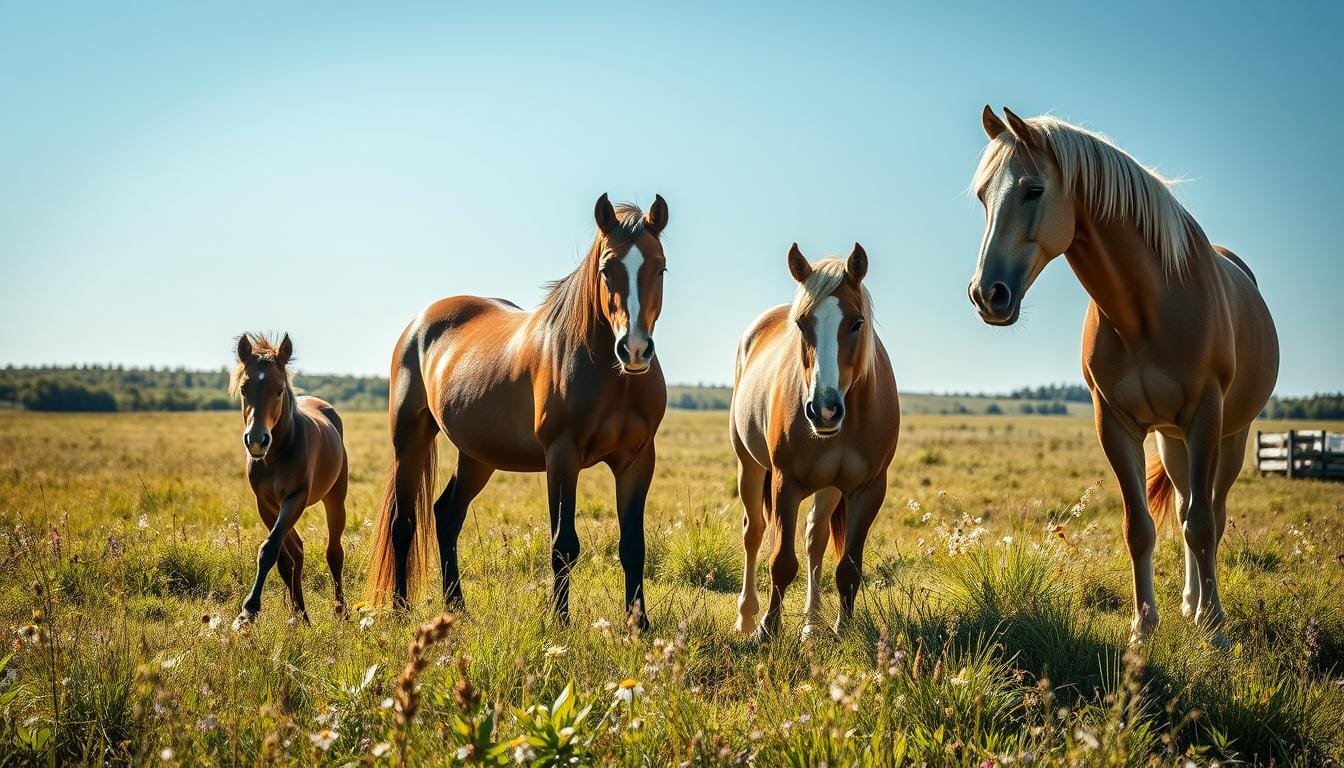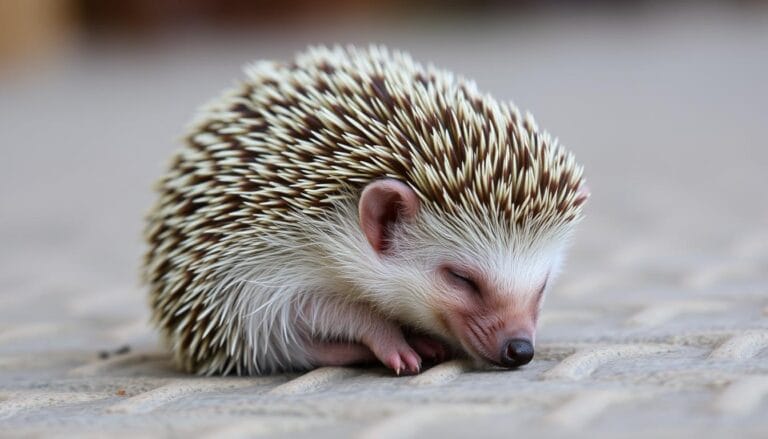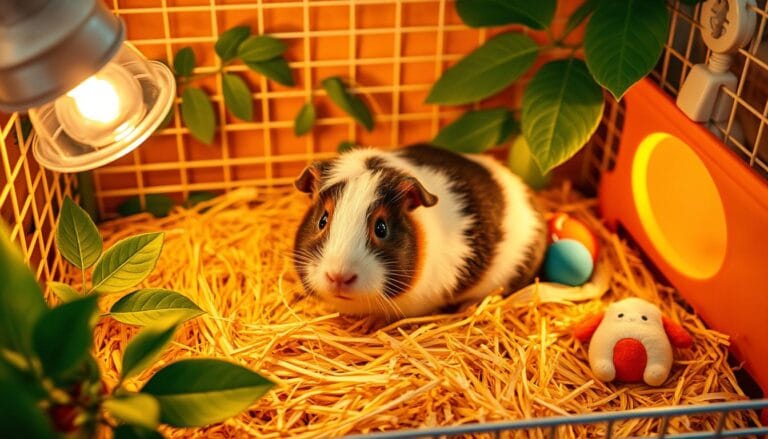How Long Do Horses Live? Surprising Lifespan Secrets Revealed!
With over 7 million domesticated horses in the U.S., you might wonder, how long do horses live? The average lifespan of a domestic horse is between 25 to 30 years. But some horses have lived into their 50s or 60s. Understanding how long do horses live is key to providing them with the best care and ensuring a long, healthy life.
Table of Contents
When thinking about how long horses live, remember that many factors matter. These include the quality of care, genetics, and nutrition. By understanding these and providing the best care, you can help your horse live a long and healthy life. This answers the question of how long can horses live.
Key Takeaways
- The average lifespan of a domestic horse is 25-30 years.
- Domestic horses have lower disease exposure and receive better care than wild horses, contributing to longer lifespans.
- Regular veterinary care, including vaccinations and dental check-ups, is essential for maintaining a horse’s health.
- Proper nutrition, including a balanced diet and adequate water, is crucial for supporting a horse’s overall health and longevity.
- Understanding how long horses can live and providing optimal care can help ensure a long, healthy life for your equine companion.
- Factors such as genetics, quality of care, and nutrition all impact how long do horses live.
- Regular hoof trimming and examinations are necessary for maintaining hoof health and preventing health declines.
The Average Lifespan of Modern Horses
When thinking about how long can a horse live, it’s key to know what affects their life span. Modern horses usually live between 25 to 30 years. Some breeds, like Arabian horses, live longer than others, like Draft horses.
The life of a horse also depends on where they live, what they eat, and their health care. Horses that get good care and live in natural-like settings tend to live longer. Regular vet visits, shots, and deworming help prevent health problems.
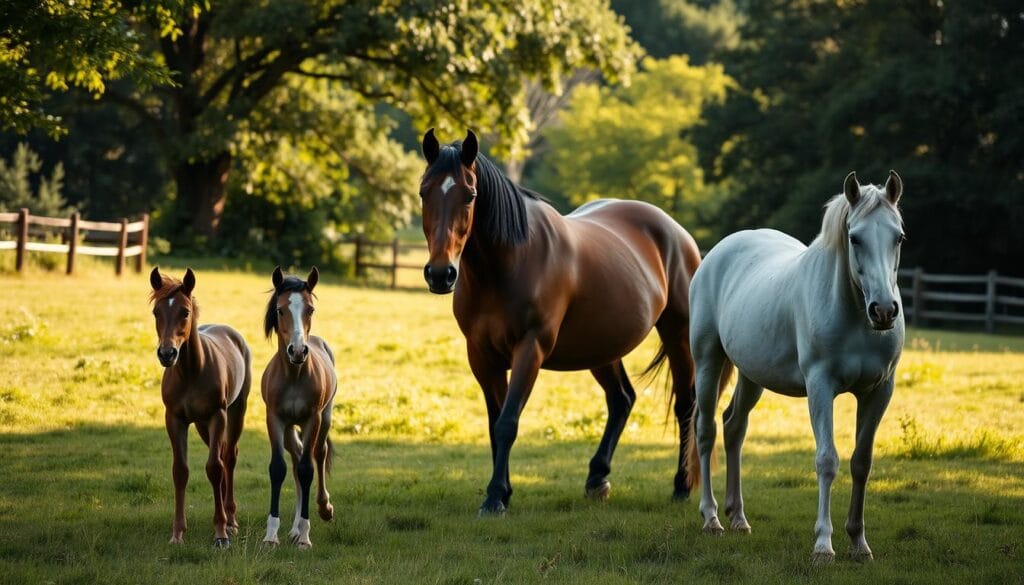
Interestingly, how long does a horse live can change a lot based on breed and living conditions. Domesticated horses often live longer than wild ones, thanks to better care and food. Size, genetics, and diet all impact a horse’s life span.
Some horses, like Old Billy, a Shire stallion who lived to 62, and Sugar Puff, a Shetland-Exmoor cross who lived to 56, show how important good care is. These stories underline the role of proper care and nutrition in a horse’s long life.
Understanding How Long Horses Live in Different Environments
When thinking about how old do horses live, we must consider their living environments. Horses in warmer or colder places may live longer or shorter lives. This depends on their access to healthcare, food, and living conditions. On average, a horse lives for about 25 to 30 years. But, this can change a lot based on where they live and how well they are cared for.
Horses that get regular grooming, good food, exercise, and vet care live longer. Those in dirty places or without good food live shorter lives. Important things that affect a horse’s life span include:
- Climate and access to healthcare
- Quality of living conditions, including pasture and stabling
- Availability of nutritious food and clean water
- Regular veterinary care, including vaccinations and dental care
Also, how old do horses live can depend on their breed and genes. Purebred horses often live longer than mixed breeds. Smaller breeds, like ponies, usually live longer than bigger ones, like draft horses.
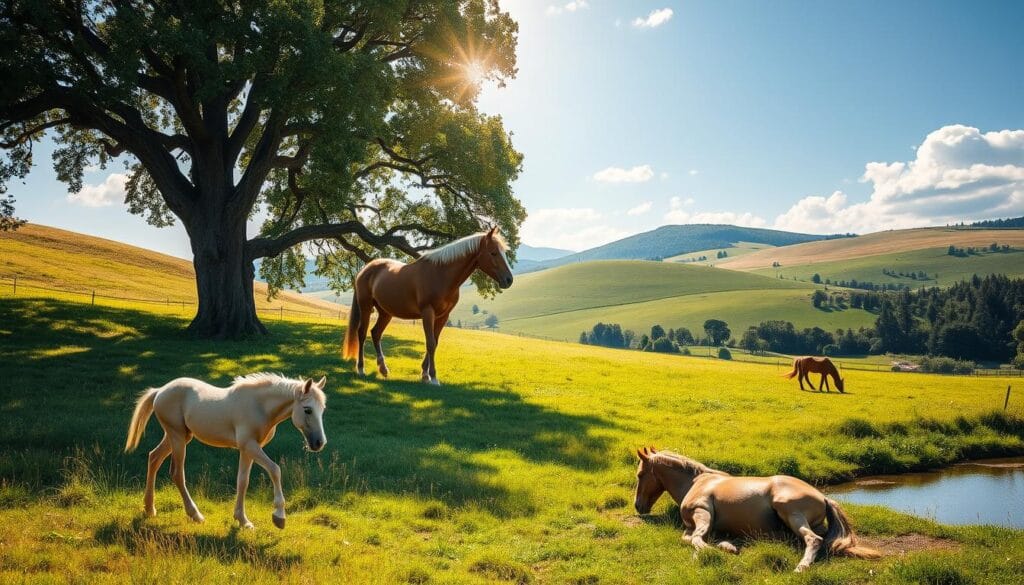
Knowing what affects a horse’s life span helps us care for them better. This way, we can help them live a long and healthy life.
Common Horse Breeds and Their Expected Lifespans
Looking at different horse breeds is key when talking about their average age. The lifespan of a horse can change a lot. It depends on things like genetics, what they eat, and how they’re cared for. On average, a horse can live for 25-30 years.
Some breeds, like ponies, can live into their 40s. Draft horses, however, usually live for 25-30 years. The care a horse gets also plays a big role. Getting regular vet checks, eating right, and exercising can help them live longer and healthier.

- Quarter horse: 25-35 years
- American Saddlebred: 30-35 years
- Arabian: 25-35 years
- Thoroughbred: 25-28 years
Knowing the average age of your horse’s breed helps you care for them better. This way, you can make sure they live a long and happy life.
The Impact of Diet on Horse Longevity
When considering how long do horses live, diet plays a crucial role. A well-balanced diet keeps them healthy and extends their lifespan. Without the right nutrients, horses can develop serious health issues, which may shorten their lives. How long do horses live is often influenced by their daily nutrition and overall care.
Proper nutrition helps prevent diet-related health problems. Horses require a mix of energy, protein, vitamins, and minerals. They also need high-quality hay and fresh grass, which provide essential fiber while keeping carbohydrate intake in check. How long do horses live can depend greatly on the quality of their diet and how well their nutritional needs are met.
Diet Tips for Horses:
- Provide high-quality hay like alfalfa or immature grass hay.
- Ensure they always have access to clean water at the right temperature.
- Monitor carbohydrate intake, especially for horses with metabolic issues.
- Maintain the right balance of protein and amino acids to support overall health.
Understanding how diet affects a horse’s health is key to helping them live longer. The care they receive, including proper nutrition, directly impacts their lifespan. A well-maintained diet ensures your horse stays healthy, increasing their chances of a long and active life.
Exercise and Its Effect on Horse Lifespan
When thinking about how long do horses live, exercise is key. It keeps them healthy and strong. A good exercise plan can stop problems like lameness and colic, which are big killers. How long do horses live is often influenced by their physical activity, as regular movement helps maintain joint health and muscle strength.
Creating an exercise plan for your horse needs careful thought. Think about their age, breed, and what they need. Young horses need lots of exercise to grow. Older horses need gentle activities to stay safe. How long do horses live can depend on whether they get the right balance of exercise and rest throughout their life.
Optimal Exercise Routines
A good exercise plan for horses mixes activity and rest. They should walk, trot, and canter, and sometimes jump or gallop. But they also need breaks to rest and recover.
Signs of Overexertion
Knowing when a horse is too tired is important. Look for signs like too much sweat, fast breathing, and tiredness. If you see these, stop and let them rest and drink water.
Rest and Recovery Importance
Rest is as vital as exercise for a horse’s health. Giving them breaks and letting them rest helps avoid injuries. Understanding the balance between exercise and rest helps your horse live a long, healthy life. By maintaining proper care and training, how long do horses live can be extended, ensuring they remain active and happy for years.
Health Care Practices That Extend Your Horse’s Life
Wondering how long do horses live? It’s key to know that regular healthcare is vital for a horse’s health and long life. How long do horses live depends on factors like genetics, diet, and medical care. With the right care, horses can live up to 35 years or more. It’s important to keep up with vaccinations, dental care, and check-ups to prevent diseases and catch health issues early.
Some key health care practices to extend your horse’s life include:
- Regular dental exams and care to prevent dental issues
- Annual vaccinations to protect against diseases
- Regular deworming to prevent parasite infestations
- Routine blood work to monitor overall health
By following these health care practices, you can help ensure your horse lives a long and healthy life. How long do horses live is not just a matter of genetics but also of the care and attention you provide throughout their life.
Common Age-Related Health Issues in Horses
When thinking about how old do horses live, it’s key to know the health issues they face with age. Horses, like all living things, can get sick as they get older. Regular vet visits and care can help keep them healthy for a long time.
Horses can get dental, joint, and digestive problems as they age. These issues come from wear and tear, bad nutrition, and genetics. For instance, older horses might have trouble eating because their teeth are worn down.
Dental Problems
Dental issues are common in older horses. Their teeth wear down, making it hard to eat and digest. Regular dental care can prevent these problems.
Joint Issues
Older horses often have joint problems like arthritis. These can come from wear and tear and genetics. Keeping them active and at a healthy weight can help.
Digestive Concerns
Digestive problems, like colic, are also common in older horses. They can be caused by bad nutrition and genetics. A balanced diet and fresh water can help.
Knowing about these health issues can help you keep your horse healthy. Regular vet visits, a good diet, and plenty of water and exercise are key. These steps support your horse’s health and happiness.
Environmental Factors Affecting Horse Longevity
The question “how long do horses live” is often asked by horse owners and enthusiasts alike. The longevity of horses is influenced by a myriad of environmental factors, which play a crucial role in their overall health and well-being. One of the most significant aspects is the quality of their living conditions. Horses that have access to spacious pastures with clean water, ample food sources, and proper shelter are more likely to live longer, healthier lives. In contrast, those kept in cramped or unhygienic environments may experience stress, illness, and a reduced lifespan. Therefore, to better understand how long do horses live, it is essential to consider their living conditions as a primary factor.
Nutrition is another critical element that affects horse longevity. A balanced diet rich in essential nutrients, vitamins, and minerals contributes significantly to a horse’s health and lifespan. Horses depend on a diet that includes high-quality hay, grains, and fresh grass. Poor nutrition can lead to various health issues such as obesity, laminitis, and digestive disorders, all of which can shorten a horse’s life. Providing the right dietary support helps ensure that horses maintain a healthy weight, strong immune systems, and overall vitality, directly influencing how long do horses live in different environments.
Furthermore, social interaction and mental stimulation are integral to a horse’s well-being. Horses are social animals that thrive in a herd environment. Isolation or lack of companionship can lead to stress, anxiety, and depression, all of which can adversely impact their health. Regular interaction with other horses, humans, and engaging activities keeps them mentally stimulated and emotionally balanced. Thus, understanding how long do horses live also involves recognizing the importance of social environments and mental health.
Lastly, regular veterinary care is a vital component of extending a horse’s lifespan. Routine check-ups, vaccinations, dental care, and appropriate medical attention when needed can prevent many common health issues. A horse that receives good medical care is more likely to enjoy a longer and healthier life, as early detection and treatment of problems can make a significant difference. In summary, how long do horses live depends on a combination of factors, including living conditions, nutrition, social interaction, and veterinary care, emphasizing the importance of holistic management in equine care.
Signs of Aging in Horses
Wondering how long do horses live? It’s key to spot aging signs in these amazing animals. Horses usually live between 25 to 30 years. Some breeds might live into their 30s with the right care and food. Aging signs often start after 15 years, with some breeds showing them in their 20s.
Common aging signs in horses include:
- Loss of muscle mass, making it hard to stand and lie down
- Diminished eyesight, causing blurred vision and trouble recognizing things
- Digestive issues, becoming more common after 15 and a big reason for aging-related deaths
- Weight changes, as healthy horses don’t usually see big weight shifts, but older ones might
It’s vital to watch your horse’s health and adjust their care as they age. With the right care, you can help your horse live a long, healthy life. Knowing how long do horses live helps you give your equine friend the best care.
Caring for Senior Horses
When thinking about how long can horses live, it’s key to know how to care for older horses. Many horses and ponies can live into their 20s or 30s with the right care. It’s important to give them the attention they need for a happy and healthy life.
Senior horses need a special diet, rich in fat and fiber, not sugars and starches. They also need to exercise carefully to avoid hurting their joints. Important things to consider for senior horse care include:
- Providing a comfortable and safe living environment
- Regular veterinary check-ups to monitor their health
- Adjusting their diet and exercise routine as needed
By understanding what senior horses need and giving them the right care, you can help them live a long and healthy life. This way, you can confidently answer the question of how long can horses live.
Life Stages of a Horse: From Birth to Senior Years
When thinking about how long do horses live, it’s key to know the horse’s life stages. Horses change a lot from birth to old age. How long do horses live depends on factors like breed, care, and environment. On average, they can live from 25 to 30 years, but some live up to 40 with good care.
Horses go through six stages: Foal, Weanling, Yearling, Adolescent, Adult, and Senior. Each stage has its own needs. For example, Foals need their mom’s milk for the first few months. As they grow, they need a balanced diet and fresh water.
Here are the six life stages of a horse:
- Foal: Birth to 3-6 months
- Weanling: 3-6 months to 1 year old
- Yearling: 1 to 2 years old
- Adolescent: 2 to 3 years old
- Adulthood: 4 to 15-20 years old
- Senior: 15-20 years old, depending on breed
Knowing these stages helps you care for your horse better. This can make your horse live longer and healthier. Regular vet visits, vaccinations, and a good diet are key. By understanding how long do horses live and their life stages, you can make better choices for your horse’s care and well-being.
Conclusion: Maximizing Your Horse’s Lifespan Through Proper Care
The average lifespan of horses is 25 to 30 years. Some horses live into their 40s. To help your horse live a long, healthy life, give them the right care.
Focus on balanced nutrition, regular exercise, and good healthcare. This way, your horse can reach their full average age of horse potential.
Smaller breeds like Arabians often live longer than bigger draft horses. Genetics matter, but so does a stress-free life and social interaction. Regular vet visits, shots, and deworming help prevent health problems.
By giving your horse the best care, they can thrive and live a long, happy life with you. Cherish the bond you share and enjoy every moment. Your commitment to their health will bring you years of joy and companionship.
FAQ
How long do horses typically live?
Horses usually live for about 25 to 30 years. Some breeds and horses can live longer.
What are the key factors that affect a horse’s lifespan?
Genetics, care quality, nutrition, and environment play big roles. Good vet care, a balanced diet, and regular exercise help horses live longer.
How do the lifespans of wild and domesticated horses differ?
Wild horses live about 15-20 years. They face harsh conditions and lack vet care. Domesticated horses, with proper care, can live into their 20s and 30s.
What are some record-breaking horse ages?
Old Billy, the oldest known horse, lived to 62. Most horses, with good care, can live into their 30s.
How do different environments impact a horse’s lifespan?
Climate, healthcare access, and shelter quality matter a lot. Horses in better climates and with vet care live longer than those in harsh conditions.
How do the lifespans of different horse breeds compare?
Draft horses live about 25-30 years. Ponies live a bit longer, 30-35 years. Racing horses live 20-25 years due to their demanding sport.
How does a horse’s diet affect its lifespan?
A good diet is key for health and longevity. Poor nutrition can lead to health issues that shorten a horse’s life.
What role does exercise play in a horse’s lifespan?
Exercise keeps a horse’s heart healthy and improves well-being. But too much or too little can cause problems. Finding the right balance is important.
What healthcare practices are important for extending a horse’s life?
Regular vet visits, vaccinations, and dental care are crucial. They help catch and treat health issues early, extending a horse’s life.
What are some common age-related health issues in horses?
Horses may get dental, joint, and digestive problems with age. Early management and treatment can keep them healthy and happy.
How do environmental factors influence a horse’s lifespan?
Climate, shelter, and living environment greatly affect a horse’s life. A safe, well-maintained home is essential for their health and longevity.
What are the signs of aging in horses?
Look for grey coats, less muscle, lower energy, and mood changes. These signs help you care for your older horse.
How should you care for senior horses?
Older horses need diet, exercise, and care adjustments. A comfy home, balanced diet, and tailored exercise support their health and happiness.
How do the life stages of a horse progress from birth to senior years?
Horses go through stages with unique traits. Understanding and caring for each stage is vital for their health and longevity.
There are no reviews yet. Be the first one to write one.

